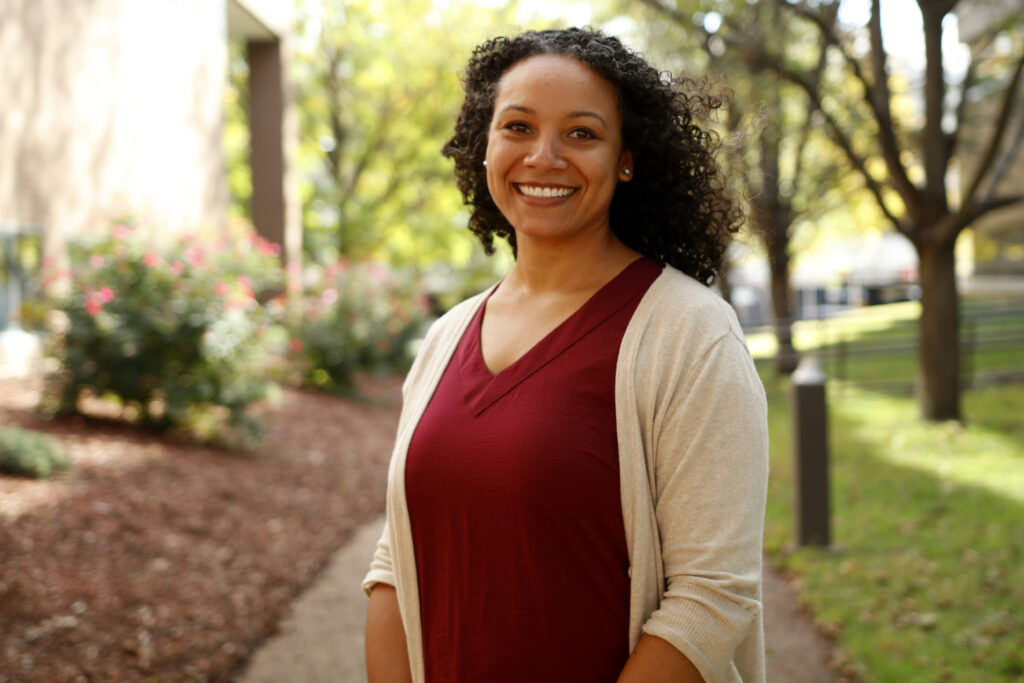Crystal Smith serves as a Connection Project Specialist at Wyman. She’s been with the organization since 2003. But she was part of the Wyman family long before that.
Smith spent every summer at Camp Wyman from the age of 11. According to Smith, who lived in foster care until she was nine-years-old, her time at Wyman allowed her to form important relationships with teens like her. She also formed much different relationships with adults that were stronger than the rocky ones she had previously experienced.
“At Wyman, I felt heard,” said Smith. “The adults around me made me feel like an important person. The bonding and trust that was established helped me become the person I am today.”
“I put that knowledge to use when I work with teens in Wyman programs. I’m aware of how I interact with young people because of the way that I wanted to feel. The relationships we have with the teens are even more important than our curriculum. It’s the foundation that allows us to build success.”
Smith has brought this idea full circle as a specialist in Wyman’s Connection program at University City High School, Webster Groves High School and Ritenour High School. Smith helps teens learn how to make more intentional connections with their peers, which helps them build empathy for one another and ease the teenage experience. The result creates a more welcoming school environment.
Previously, Smith also served as a program specialist for Wyman’s Teen Outreach Program® (TOP®) at Normandy Schools Collaborative, which lost accreditation in 2013.
Again, Smith listened. “As our staff worked to build relationships and listen to the teens, we realized they had serious concerns. They feared that their school would shut down, and they weren’t happy about the way they were being portrayed. It began to affect their feelings about their own education. When it came time to do our community service as part of our TOP curriculum, the teens developed a ‘Normandy Strong’ campaign to show people who they really were.” Smith helped the teens organize a peaceful walkout, and gained the support of school staff and local police department.
“As adults, we must understand that teens have an important voice at the table. It’s our job to help them find their voice and stand beside them. This exercise empowered them to change the narrative about their community and their school.”
In 2016, Wyman began working toward a system-wide solution for Normandy Schools Collaborative to help the school achieve better outcomes with greater efficiency. Wyman is delivering programs to teens; training employees on how to support teens who experience trauma; and aligning all of the district’s non-profit partners.
“I’m proud to work for an organization that really listened to the concerns that the teens and our team had in Normandy. Although we were delivering great programming at the time, we knew we needed to do more. And, we found a way to help the school support students at a higher level. Ultimately, this collaborative approach is going to help the school improve the outcomes for hundreds of young people. I’m glad to work with a team who is willing to tackle this challenging work and develop innovative new solutions for the sake of our young people. From training for all district staff, to coordinating the services being provided in each school, it’s clear that our feedback was heard and taken seriously, and I’m excited about where that will take us.”
How do you believe you are making a difference?
“One of the biggest challenges facing teens today is achieving academic success while dealing with all kinds of unstable environments. But through Wyman, I get to help teens learn how to advocate for themselves in a healthy manner, and how to have stronger, healthier relationships with their peers and teachers by developing social-emotional skills. I get to listen to their experiences, insights and aspirations, and work together with them to build the skills they will need to reach their goals. I help them learn the importance of things like empathy and acceptance, and I get to empower them to use these qualities, teach others how to use them, and give them the opportunity to create change in their communities,” said Smith.
“Young people are becoming more engaged in their communities and taking interest in helping others by participating in community service. I’ve seen students visiting on their own time because of the impact of their visit with senior citizens,” added Smith.


